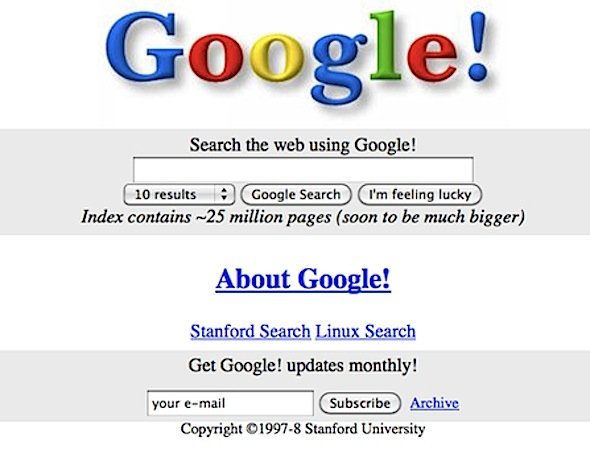It is hard to believe that back in the day there was no Google. Today it is second nature to just “Google” whatever you need to know, from learning to tie a tie, to watching season two of Stranger Things, to getting your degree online. We take for granted the immense power, reliability, and precision of our “favorite” search engine, and not many people know the full story of the creation of Google. Buckle down and get ready for the story you never knew.
The story of Google begins at Stanford University in California, where two young Computer Science graduate students were working on a research project in 1996 for the Stanford Digital Library Technologies. Sergey Brin and Larry Page (the initial Co-Founders of Google) were working on a way to make digital libraries work better and more efficiently. Before there were search engines on the internet, early internet users used a “web crawler” to index books and to analyze the connections between them. The “web crawler” that Larry and Sergey created would use information from books to give relevance and usefulness by the quality and number of citations from the books.1 This would be a precursor for the ideas behind the platform we know as Google search.


When Larry and Sergey were working on their “web crawler,” they decided to create an algorithm known as PageRank. This is what makes Google Google. It ranks websites by their search engine results.2 They simply took the same concept from their index of books, but instead of just books, the program analyzed websites and their search relevance from the web. Once the two understood what they had created, they quickly started working on BackRub, the first company name before picking the name we all know, Google.3 Larry and Sergey released the first ever version of Google on the Stanford Website in August 1996 as a beta test. Soon after releasing their beta test, they were astonished by the success of Google. As a result of this, the two needed a place to set up an office and their equipment. So Larry and Sergey decided to use their dorm rooms as there central hub for all of their work. Since the BackRub crawler utilized much of Stanford’s network bandwidth, which was a blessing and a curse, the internet at Stanford would regularly crash and go down for periods of time. But thankfully, no one at Stanford gave the two any trouble, since everyone was impressed with what Larry and Sergey were doing at Stanford. Once Google started getting bigger, Larry and Sergey needed a new place to start, so they asked their friend Susan Wojcicki, also a graduate at Stanford University, if they could rent out her garage.

On September 7, 1998, Google was established. It initially was able to deliver over 10,000 web searches, which gained the reputation for being the most reliable source of information on the internet. By mid-1998, Larry and Sergey started receiving financing from one of the most well-known co-founders in Silicon Valley, Andy Bechtolsheim, from Sun Microsystems Inc. As a result of Bechtolsheim’s investment, Google started raising over $1 million from other investors, family, and friends. A year later, in 1999, Google was searching over 500,000 web searches a day. That same year, Google received $25 million from rounds of venture capitalists because of Google’s tremendous search results. And by 2000, because of Google’s search engine power, they became the client search engine for Yahoo, although by 2004 Yahoo terminated its contract with Google. As a result of Google’s rapid growth, many internal management problems started to occur. Larry and Sergey knew they needed someone with a vast amount of knowledge on running a business, and they needed an experienced manager. So they decided to hire Eric Schmidt, who was the CEO of Novell, a software and service company. Larry and Sergey both agreed that Eric would be the CEO of Google, while Larry would be the president of products and Sergey the president of technology. These three men brought Google to new heights and significant growth.4 The astonishment doesn’t stop there, as Google currently processes over 40,000 searches every second on average, which translates into over 3.5 billion searches a day and 1.2 trillion per year. Who would have thought that one of the world’s most renounce tech companies would join many others in the cliche of starting in a garage where the probability of creating technological evolution was equal to finding life on Mars. Now their headquarters is a mega office in Mountain View, California.

In a matter of a couple of years, the two Stanford graduate students Larry Page and Sergey Brin were able to create the most valued and well-known company of the twenty-first century.5 Over the coming years, Google started innovating what it meant to be a search engine, forming Google Images, Google Maps, Google Chrome, Gmail, YouTube, Android, and so much more. As of 2015, Larry Page and Sergey Brin created Alphabet Inc., which is the multinational conglomerate of Google that includes Waymo (self-driving cars), Google Fiber (internet provider), Nest Labs, and many more companies owned by Google but under the umbrella of Alphabet.
- Encyclopædia Britannica, September 2017, s.v. “Google Inc.,” by Mark Hall. ↵
- Nicholas Carlson, “The Untold Story Of Larry Page’s Incredible Comeback,” Business Insider (April 2014). ↵
- The name Google is a play on words from the word “googol” which is 1.0 × 10^100. ↵
- Steven Levy, In the plex: how Google thinks, works, and shapes our lives (New York: Simon & Schuster, 2011), 9-11. ↵
- David Vise, “The Google Story,” Strategic Direction 23, no. 10 (April 2007): 192-199. ↵



63 comments
Kimberly Simmons
I am not ashamed to say I use Google every day. I loved this article and the approach you took with it! At first I didn’t understand what the relevance of “web crawlers” were, but I guess even Google had to start somewhere, right? It never ceases to amaze me that some of the greatest inventions on Earth come from college students – that goes to show the potential of our generation! The story behind the creation of Google is quite inspirational; a very interesting topic.
Seth Castillo
Google’s story is really inspirational because all it took was two guys and a small dream. I’m more than sure they weren’t dreaming about the amount of money they would be making, they probably were just thinking about how they could make the site better and more streamlined. The UI has changed so much since its initial release that if it wasn’t for that iconic name someone would assume that the old was just a scam. The IoT has grown so much now because of companies like Google, that it gives hope for future companies to reach everyone across the world.
Deanna Lummus
This whole article was amazing. The subject matter is so amazing to heart. Its crazy how this started the 90’s. It really blows my mind that it started in a dorm room, to a garage, to now being one of the biggest companies in the entire world. I didn’t know how Google got started but I knew just how big it got. Youtubers even work for Google. They employ so many people and they are always progressing and innovating. I never know what else they are going to come up with. This article really broke it down for me and let me in on something I never knew.
Carlos Aparicio
The reason I️ found this article interesting is because Google is such a huge part of all of our lives today. I️ loved reading about the history of how it came to be! Who knew that only two college students would then advance to become millionaires of a program that everyone in the world uses. After reading this article, it is fair to say that any dream is possible if you put your mind to it.
Maria Callejas
First and foremost, great introduction! I was hooked the entire time. You clearly depict the importance of this website in our day to day lives. This article was a complete learning session for me, as I had no prior knowledge about the origins of Google, so thanks for that! Great usage of evidence throughout the piece. It is amazing to see how it all started as a research project by two college students. Sergey Brin and Larry Page definitely leave big shoes to fill for us university students! Great article.
Ezequiel De La Fuente
Interesting too see how Google was born. I didn’t know that it started as something as small as a class project. Page and Brin truly built Google from the ground up and it continues to grow today. I know that Google is my go to whenever I have any type of question. I enjoyed reading history on Google and your article overall.
Alise Balderas
The title caught my attention the most! The most interesting part about this story was the fact that Google was born in college dorm room! It gives me and the people around me a feeling of possibility and hope. I had no idea how Google came about and I am glad I finally know! Google is a such a prevalent and dominating force in today’s society, so reading about the beginnings of it changed my view, seeing how far the company has come!
Clarissa Bustamante
Great article! I enjoyed learning more about something that I use almost all the time. It is crazy to read that google has gone through so many changes of management when to me I see no change in it. I liked how the article included the development of google from the start of its creation. I didn’t really know how this search came about but hearing that the idea of it started off in a college dorm room. overall it was a great article.
Christine Sackey
It is so fascinating that Google was created basically inside of a dorm room. I think that it really amazing. Google is such a huge company now. I really can not imagine not having google because it makes looking up things so easy. I use it every day. This article was really well written and flowed nicely. Great job!
Justin Garcia
This was a great article. It really tells a relevant story to the current generation. I enjoyed the way the article followed the development of Google from it’s creation. The fact that google has gone through different manager’s is interesting since Google haven’t changed much over the years. The search engine keeps updating with more information and has never done drastic changes that have hindered the user experience.